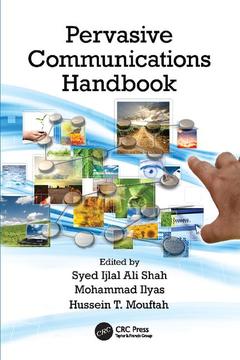Description
Pervasive Communications Handbook
Coordinators: Shah Syed Ijlal Ali, Ilyas Mohammad, Mouftah Hussein T.
Language: English
Subjects for Pervasive Communications Handbook:
Keywords
QoS Routing; QoS Routing Protocol; Technology; Smart Phones; Architecture; Sensor Nodes; Challenges in Testing Context-Aware Applications; Power Consumption; Low-Power Design for Smart Dust Networks; WSNs; Interoperability in Pervasive Environments; Mac Protocol; Sk; Md; Mizanur Rahman; Mac Layer; Hussein T; Mouftah; Energy Conservation; Rana Ejaz Ahmed; Context Aware Applications; Muhammad K; Dhodhi; Routing Protocol; Syed Ijlal Shah; Mobile Nodes; Marwan Fayed; Service Discovery; Jamal N; Al-Karaki; Route Request Packet; Ibrahim Al-Oqily; TDoA Measurement; Ishfaq Ahmad; Pervasive Environment; Victor Yongfang Liang; QoS Support; Zhihai (Henry) He; RFID Reader; Zdravko Karakehayov; Energy Sources; Jahangir H; Sarker; Sensor Networks; Ahmed Badi; Packet Generation Rate; Imad Mahgoub; Slotted ALOHA; Michael Slavik; Smart Grid; Yu-Chee Tseng; Mac Sublayer; Chi-Fu Huang; Temp Id; Sheng-Po Kuo; Junhui Zhao; Xuexue Zhang; Joel I; Goodman; Albert I; Reuther; David R; Martinez; Imen Ben Lahmar; Hamid Mukhtar; Djamel Belaïd; Sami Saleh Al-Wakeel; Eduardo B; Fernandez; Arny Ambrose; Mihaela Cardei; Claire Maternaghan; Kenneth J; Turner; Huangmao Quan; Jie Wu; Yuan Shi; Guruduth Banavar; Norman Cohen; Danny Soroker; Khaled A; Ali; Melike Erol-Kantarci
Publication date: 06-2017
· 15.6x23.4 cm · Paperback
Publication date: 12-2011
726 p. · 15.6x23.4 cm · Hardback
Description
/li>Contents
/li>Readership
/li>Biography
/li>
In an emergency, availability of the pervasive communications environment could mean the difference between life and death. Possibly one of the first guides to comprehensively explore these futuristic omnipresent communications networks, the Pervasive Communications Handbook addresses current technology (i.e., MAC protocols and P2P-based VoD architecture) and developments expected in the very near future, when most people and places will be virtually connected through a constant and perpetual exchange of information. This monumental advance in communications is set to dramatically change daily life, in areas ranging from healthcare, transportation, and education to commerce and socialization.
With contributions from dozens of pioneering experts, this important reference discusses one-to-one, one-to-many, and many-to-one exchanges of information. Organized by the three key aspects?technology, architecture, and applications?the book explores enabling technologies, applications and services, location and mobility management, and privacy and trust. Citing the technology?s importance to energy distribution, home automation, and telecare among other areas, it delves into topics such as quality of service, security, efficiency, and reliability in mobile network design, and environment interoperability.
Section I: Technology
Privacy-Preserving Anonymous Secure Communication in Pervasive Computing
Challenges in Testing Context-Aware Applications
Medium Access Control Protocols for Wireless Sensor Networks in a Pervasive Computing Paradigm
On the Quality of Service Routing in Mobile Ad Hoc Networks
Power-Aware Video Compression for Mobile Environments
Low-Power Design for Smart Dust Networks
Security Improvement of Slotted ALOHA in the Presence of Attacking Signals in Wireless Networks
Analysis and Classification of Reliable Protocols for Pervasive Wireless Sensor Networks
Positioning and Location Tracking in Wireless Sensor Networks
Wireless Location Technology in Location-Based Services
Next-Generation Technologies to Enable Sensor Networks
Section II: Architecture
Interoperability in Pervasive Environments
P2P-Based VOD Architecture: A Common Platform for Provisioning of Pervasive Computing Services
Using Universal Plug-n-Play for Device Communication in Ad Hoc Pervasive Environments
Section III: Applications
Wireless Network Security for Health Applications
Sensor Networks in Healthcare
Pervasive Computing for Home Automation and Telecare
Online Social Networks and Social Network Services: A Technical Survey
Pervasive Application Development: Approaches and Pitfalls
Wireless Personal Area Networks: Protocols and Applications
Pervasive Energy Management for the Smart Grid: Towards a Low Carbon Economy
Dr. Syed Ijlal Ali Shah is a data path systems architect at Freescale Semiconductor. There, he has defined and worked on the architecture of the company’s traffic management co-processor, the RapidIO Fabric, which is an alternative backplane interconnect technology to Ethernet, and preferred for use in base stations. He has also been a key contributor to several other network-related projects. He was a key member of the team that worked on ATM switches and networks when the technology was first introduced. Dr. Shah holds a Ph.D and an MS in electrical engineering from Columbia University, as well as a master’s in engineering management from the University of Ottawa. He has more than 15 years of experience in the telecommunications and datacom industries, having contributed to leading-edge technology through academic papers, industrial contributions (products), and patents—including four of his own for call admission control algorithms for switches/routers and dynamic IP/ATM congestion management, with several more pending.
Dr. Mohammad Ilyas received his BSc in electrical engineering from the University of Engineering and Technology, Lahore, Pakistan, and he completed his Ph.D at Queen’s University in Kingston, Ontario, Canada. Since September 1983, he has worked at the College of Engineering and Computer Science at Florida Atlantic University, Boca Raton, where he is currently associate dean for research and industry relations. Before that, from 1994 to 2000, he was chair of the Department of Computer Science and Engineering. Dr. Ilyas has conducted successful research and been published in various areas, including traffic management and congestion control in broadband/high-speed communication networks, traffic characterization, wireless communication networks, performance modeling, and simulation.
Hussein T. Mouftah received his BSc and MSc from Alexandria University, Egypt, and his Ph.D from Lava




